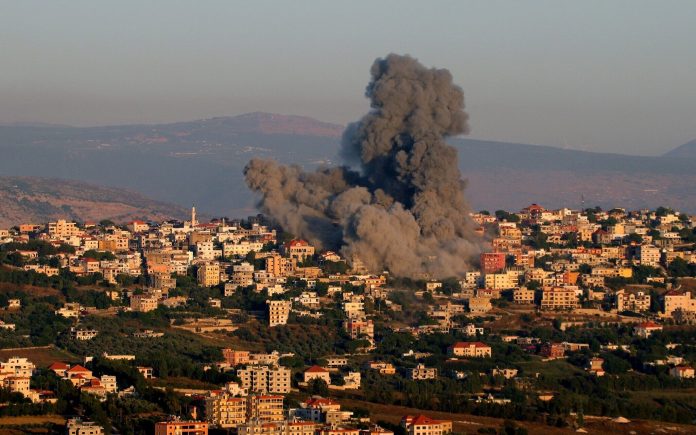The mediators from the US, Europe and the Arab world insist on preventing the conflict between Israel and Hezbollah from spiralling into a wider war in the Middle East, POLITICO reported.
US and European diplomats and other officials are warning Hezbollah, which is far stronger than Hamas, not to challenge Israel’s military might. They also caution Hezbollah cannot count on the US or anyone else to deter Israeli leaders if they decide to implement militant plans for an offensive on Lebanon. The Israel-Hezbollah border has levelled off slightly this week, even though daily strikes still continue in the border area. Hoping to calm the unrest, Washington has sent a landing ship with the Marine Expeditionary Force to join other warships in the area.
UN humanitarian chief Martin Griffiths used the word “apocalyptic” for the situation that the war between Israel and Hezbollah could lead to. Both sides have the potential to cause heavy casualties on both sides, as well as lead to dire consequences for the Middle East, according to Defence Minister Lloyd Austin. Israeli Defence Minister Yoav Gallant, in turn, stressed: “We are working closely together to achieve an agreement, but we must also discuss readiness on every possible scenario.”
Gerald Feierstein, a former senior US diplomat in the Middle East, stated that “the Israelis are still… arranging themselves in the expectation that there will be some kind of conflict… an entirely different magnitude of conflict.” He further added that in case of the slightest failure of the Israeli Army in its offensive on Lebanon, Washington would intervene because “they would see any alternative to that.”
Analysts expect other militias allied to Iran in the region to respond much more forcefully than they did to Hamas. Although Iran, which is busy with a political transition at home, is showing no signs of seeking war now, however, Tehran regards Hezbollah as its strategically important partner in the region and could find itself drawn into it.
France and other European countries, along with Qatar and Egypt, act as mediators. The Biden administration has told the Israelis that it supports Israel’s right to self-defence, but opening up the second front is not in their interest, yet they have not ruled out such a scenario. White House national security spokesman John Kirby said:
We’re going to continue to help Israel defend itself; that’s not going to change.But as for a hypothetical – specifically with respect to the northern border line… – again, we want to see no second front opened, and we want to see if we can’t resolve the tensions out there through diplomatic processes.
The hope remains that if Israel ends the Rafah offensive and does not launch any new major offensive in the Gaza Strip, Hezbollah may ease rocket fire into Israel even without a complete ceasefire, said Randa Slim, a senior fellow at the Middle East Institute. However, without a complete ceasefire in the Gaza Strip, any temporary calm on the Lebanon-Israel border is not enough, according to Slim.
Solidarity in face of war threats from Israel
Lebanese Foreign Minister Abdallah Bou Habib on Friday called on countries to show solidarity with Lebanon in the face of Israeli threats to go to war. He commented on the situation that has emerged in recent days. A number of countries, including Canada, Germany, North Macedonia, the Netherlands, the United States and others, have called on their citizens to leave Lebanon or avoid travelling to it.
Bou Habib apealed to countries to replace statements that cause concern to citizens and tourist with statements of solidarity that will show their support for Lebanon, and urged countries to step up efforts to pressure Israel to stop military attacks.
Earlier, Israeli leaders vowed to stage scenes of devastation in Lebanon similar to the situation in the Gaza Strip if a full-scale war breaks out. The Israeli army is stretched thin after a nearly nine-month war in the Gaza Strip, while Hezbollah has an arsenal of about 150,000 rockets and missiles capable of hitting anywhere in Israel.
Hezbollah began firing rockets into northern Israel from 7 October and has vowed to continue until a ceasefire is reached. Israel has retaliated, forcing tens of thousands of civilians to flee the border in both countries. The attacks intensified this month after Israel killed a top Hezbollah commander and Hezbollah responded with some of its most powerful rocket attacks.
